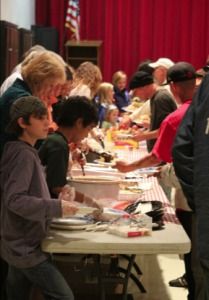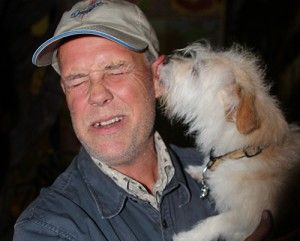During Greek recruitment junior Onur Sahin brought his potential Sigma Phi Epsilon fraternity brother, Jonathon, to Thursday night dinner for Sigma interviews.
“Most people just go to the Caf and talk over a meal, but I like to do weird stuff for my interviews just to kind of see how they’ll react in different circumstances,” Sahin said in November.
The “unorthodox” dinner was at SOS (Standing on Stone) Malibu, held every Thursday at 7 p.m. in the Webster Elementary School auditorium. Though it mirrors a soup kitchen or food bank, SOS is more accurately a homeless ministry.
It was when alumna Holly Packman, who earned her master’s degree from Pepperdine in 1997, and her husband, Daniel, took in a homeless friend, Frank, whom they had met at a coffee shop, that SOS started to form. Holly and Daniel co-founded SOS in the early 2000s and have since garnered a free-spoken reverence within the Malibu homeless community.

Before the meal, Daniel asked everyone to come out from the back and sit down.
With a faded orange Pepperdine cap and laminated nametag, he took the microphone to begin the night.
“I don’t know about you, but having something consistent and something you can count on with so many things in our lives is difficult to find,” Daniel said.
It’s hard to count on a friend and the government, he said.
“But when you can count on something that is consistent, that’s reassuring. We are here every Thursday night. We have a meal, and we have a time of just fellowship and community,” Daniel said.
As it rained outside, Daniel announced that they had sleeping bags and tarps, but not enough for everyone.
“I know a lot of you guys are cold and wet … It’s terrible out there right now … I know this world is gnarly, it’s tough, it’s hard to stand firm and to be steadfast,” Daniel said. “I’m just so glad you guys got here tonight. Stick around; something’s going to happen tonight.”
With that, the women went to stand in line, and the men followed.
When the volunteers, many from Pepperdine, were done serving food, they joined the groups at their tables. They offered advice and followed up with recent problems or achievements. They shared stories or Bible verses. Mostly, though, the volunteers just listened to what their homeless, or transitioning, friends wanted to talk about.
Many of the Pepperdine volunteers come for some sort of freshman seminar requirement, but most stay for the stories they hear and people they meet.

During dinner, Sahin retold an anecdote about a man he met at SOS who told him about how he discovered Britney Spears, how he’s immortal and how he’s figured out how to get to Mars in a day, but the government won’t let him release that information to the public.
“It was at first entertaining, but you slowly realize that’s a person and he’s been through a lot of crazy stuff in his life,” Sahin said. “And then you talk to other people who are a little more articulate about the stuff they’ve been through; all these people are just victims of poor circumstances.”
Winston and Alabama Phil are two original members of SOS, but they don’t see themselves as victims.
“It ain’t really that bad to be homeless. Everybody cries about it a lot. But after you’re out there, you feel the freedom of not having nothing. Sometimes there’s a freedom to it,” Alabama Phil said.
Alabama Phil is used to being homeless. In the 1980s he rode freight trains across the U.S. and got his first taste of a nomadic existence. He came to Malibu in 1999 with $15,000 in the bank and met Winston thereafter.
“We all came in about the same time, but now about half of our friends are dead from alcoholism,” Alabama Phil said. According to the two, alcohol is more prevalent than other drug use in the homeless community.
“We’ve seen people come through here more than we’ve got fingers that aren’t with us no more,” Winston said.
Close friends, too, Alabama Phil added. He listed off to Winston the friends they’ve lost to alcohol over the years: Don, Sarge, Frank, Three-strings Greg.
“It’s like the whole regimen died. We’re the last of the regimen,” Winston said.
Alabama Phil said their livers give out, and they end up vomiting their stomachs up.
“Can’t drink without eating forever without it affecting you,” Winston said.
Winston had been 106 days sober from alcohol that night. Alabama Phil proudly claimed four years off of heroin. Seeing friends die was enough to bring them to sobriety, or what they call “coming to reality.”
For them, through the Bible, SOS caters to their psychological needs more than spiritual. And that’s what works. It’s what keeps Alabama Phil off of heroin. Neither Winston nor Alabama Phil goes to a twelve step program.
Since 1999, Winston and Alabama Phil have served as quiet patriarchs of the Malibu homeless.
They told a recent story of a friend named Caroline, a “little 98-pound thing against the world,” who washed up in Malibu from Charleston, S.C. “Little Caroline” had become schizophrenic and ran away from home. Through a lot of people and prayer, Winston said, the 26-year-old nursing student was reconnected with her mom back home.
“And that’s a funny thing about the homeless,” Alabama Phil said. “They see people like that and all the rest of them would just let them go. The homeless will feel sorry for them and get them home.”
Winston is still homeless today, but Alabama Phil has a place behind his work, the Artifac Tree. They both don’t mind being homeless.
Alabama Phil compared his lifestyle to a John Steinbeck novel.
“Steinbeck kind of rewrote it for us,” Alabama Phil said In fact, if Alabama Phil wasn’t tied up with his job, he sees himself still hitchhiking. The only difference today may be his smartphone, which according to him, all homeless people have.
“You got to have a cell phone to communicate in today’s world,” Winston said.
For now, the two friends couldn’t see themselves living anywhere but Malibu.
Not even nearby Topanga Canyon appeals to them. They describe it as a completely different culture. Every homeless community, Winston said, has their own cliques and dynamics, own lingo, own hierarchies and own social orders.
“Malibu is the best place to be homeless,” Alabama Phil said.
His old friend interrupted him again.
“It’s just the best place, period.”
Follow Mariella Rudi on Twitter.
